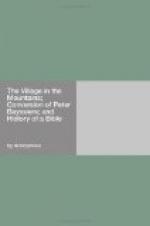In this description of the protestant worship, imperfect as it was, I thought I could recognise those traits of simplicity that characterized the worship of the primitive christians: and when your mother had finished, I said to myself, “This is indeed like the worship recorded in the Acts of the Apostles.” But I added, without allowing her to perceive the extreme satisfaction that this information afforded me, “Is this all you know of the protestant worship? Did you never see them receive the sacrament?”
“Yes, I have,” she replied, “on that same day, which was the only time I ever entered their church.”
“Do tell me, then, how was it conducted?”
“I told you, if you remember, that there was a table in front of the pulpit: this table was their altar; it was covered with a very white cloth: in the middle of it were a plate of bread and two chalices of wine. When the minister had finished preaching, he took a book, and read from it some beautiful passages on the communion, sufferings, and death of Christ; he also spoke of the duty of communicants; then every one stood up while he prayed: after which he descended from the pulpit, and came in front of the holy table; he here repeated aloud some words which I have forgotten, and took a small piece of bread and ate it; this done, he took the two cups in his hands, and again saying something that I did not hear, he drank some of the wine. The elders then approached the table, and each received a piece of bread, which they ate, and drank a little of the wine from the cup which was presented to them. The rest of the congregation did the same, the women after the men; and when all had communicated, the minister re-ascended the pulpit, gave another exhortation, offered a concluding prayer, and closed the whole by urging upon them the care of the poor.”
“This,” thought I, “is indeed the supper of the Lord!”
The conformity that I had already observed between the practices of the protestants and those of the primitive christians, created in me a feeling of joy which I had never before experienced. I desired, with renewed ardour, to search to the bottom of their doctrines, and from that time I anticipated that I might myself become a decided Protestant. This expectation, my children, soon increased into a certainty.
On the tenth of February last, two pamphlets fell into my hands; one was published by a Roman Catholic priest, and contained an attack on the protestant religion: the other was an answer, in defence of that religion, written by a protestant minister: these were the first words of religious controversy I had ever read, and eagerly did I devour these two little works. That of the first (which had been written on the occasion of a respectable family having recently embraced the Protestant faith) contained nothing that was solid, or that I could not have refuted in the very words of Christ and his Apostles; therefore I did not dwell upon it. But the second, under




